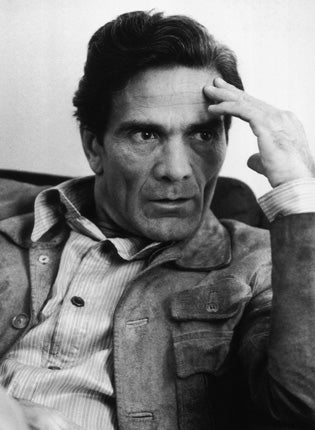The film maker, the confession and the murder that refuses to die
Ex-opposition leader calls for 35-year-old inquiry into death of Pier Paolo Pasolini to be reopened

Your support helps us to tell the story
From reproductive rights to climate change to Big Tech, The Independent is on the ground when the story is developing. Whether it's investigating the financials of Elon Musk's pro-Trump PAC or producing our latest documentary, 'The A Word', which shines a light on the American women fighting for reproductive rights, we know how important it is to parse out the facts from the messaging.
At such a critical moment in US history, we need reporters on the ground. Your donation allows us to keep sending journalists to speak to both sides of the story.
The Independent is trusted by Americans across the entire political spectrum. And unlike many other quality news outlets, we choose not to lock Americans out of our reporting and analysis with paywalls. We believe quality journalism should be available to everyone, paid for by those who can afford it.
Your support makes all the difference.Thirty-five years after Pier Paolo Pasolini's battered body was found on a bleak beach near Rome, the government is under pressure to reopen the inquiry into the mysterious murder of the iconoclastic film maker.
Walter Veltroni, the former leader of the opposition, has written an open letter to the Justice Minister, Angelino Alfano, asking why, despite the mass of unanswered questions, authorities have yet to make amends for an investigation that "was riddled with holes, like many others of the time".
The letter, published yesterday in Corriere della Sera, Italy's biggest daily newspaper, says recent advances in forensic science should allow investigators to finally address many of the doubts surrounding the killing in 1975 of the gay Marxist intellectual, whose films included The Gospel According to St. Matthew.
Shortly after the crime, a 17-year old rent-boy, Giuseppe Pelosi, confessed and was jailed for nearly 10 years but many clues point to the involvement of other people. Italy's secret services also showed a strange interest in the initial investigation and important clues appeared to be ignored, making the death of the artist as much discussed as his life.
Even at the time, the president of the Juvenile Courts, Judge Alfredo Carlo Moro, said that "the bench believes that overwhelming evidence emerges from the proceedings that Pelosi was not alone that night [on the beach]".
In 2005, three decades after his conviction Pelosi retracted his confession, which he said was made under the threat of violence to his family. He claimed that three people "with a southern accent" attacked Pasolini on the beach in Ostia, while shouting "Dirty communist". This led to the case being briefly reopened, but the judges soon said they could not continue because of a lack of evidence.
But Mr Veltroni, the former mayor of Rome, is calling for the remaining evidence to be re-examined. "We have to keep looking for the truth," he wrote to the minister. "Now science and technology can help us to make a definitive judgment. Now you, supplying an impulse to the initiative could perform a very important role."
He quoted Luciano Garofano, a former director of the carabinieri RIS forensic unit, as saying recent scientific advances mean that the clothes, sweat and blood samples found at the scene, as well as the stick Pasolini is said to have used in an attempt to defend himself, should all be retested.
After being savagely beaten, Pasolini was run over several times by his own car. Inside the vehicle, investigators found a jumper that belonged to neither the murder victim nor the 17-year-old convicted for the crime. There were also bloody fingerprints that were not checked.

Watch Apple TV+ free for 7 days
New subscribers only. £8.99/mo. after free trial. Plan auto-renews until cancelled

Watch Apple TV+ free for 7 days
New subscribers only. £8.99/mo. after free trial. Plan auto-renews until cancelled
Sergio Citti, a film director and friend of Pasolini, has claimed that five men committed the murder, which he thinks was a political killing. Five years ago, in a newspaper interview, he said: "Pelosi was only a boy. He acted as a bait for those five. They only used him, they needed somebody to blame for the crime." Mr Citti claimed that Pasolini was murdered elsewhere and his body dumped on the beach.
A year before his death, Pasolini had written his famous article in Corriere della Sera titled The Story of the Multiple Murders in which he claimed to know "the names of serious, important individuals who are behind the tragic youngsters who have opted for the suicidal fascist atrocities and the common criminals, Sicilian and others, who have made themselves available as hitmen or killers ...".
In Italy, Pasolini's poetry, and his political and philosophical essays written in the 1960s and 1970s are often considered his most important works. Abroad, he is best known for his controversial films, which include Teorema, an allegorical look at the mores of Milan's upper classes, as well as Salo, a harrowing work that evokes the writing of the Marquis de Sade to criticise political corruption and fascism. The film, which remains banned in some countries, was released shortly after Pasolini's murder.
Join our commenting forum
Join thought-provoking conversations, follow other Independent readers and see their replies
Comments